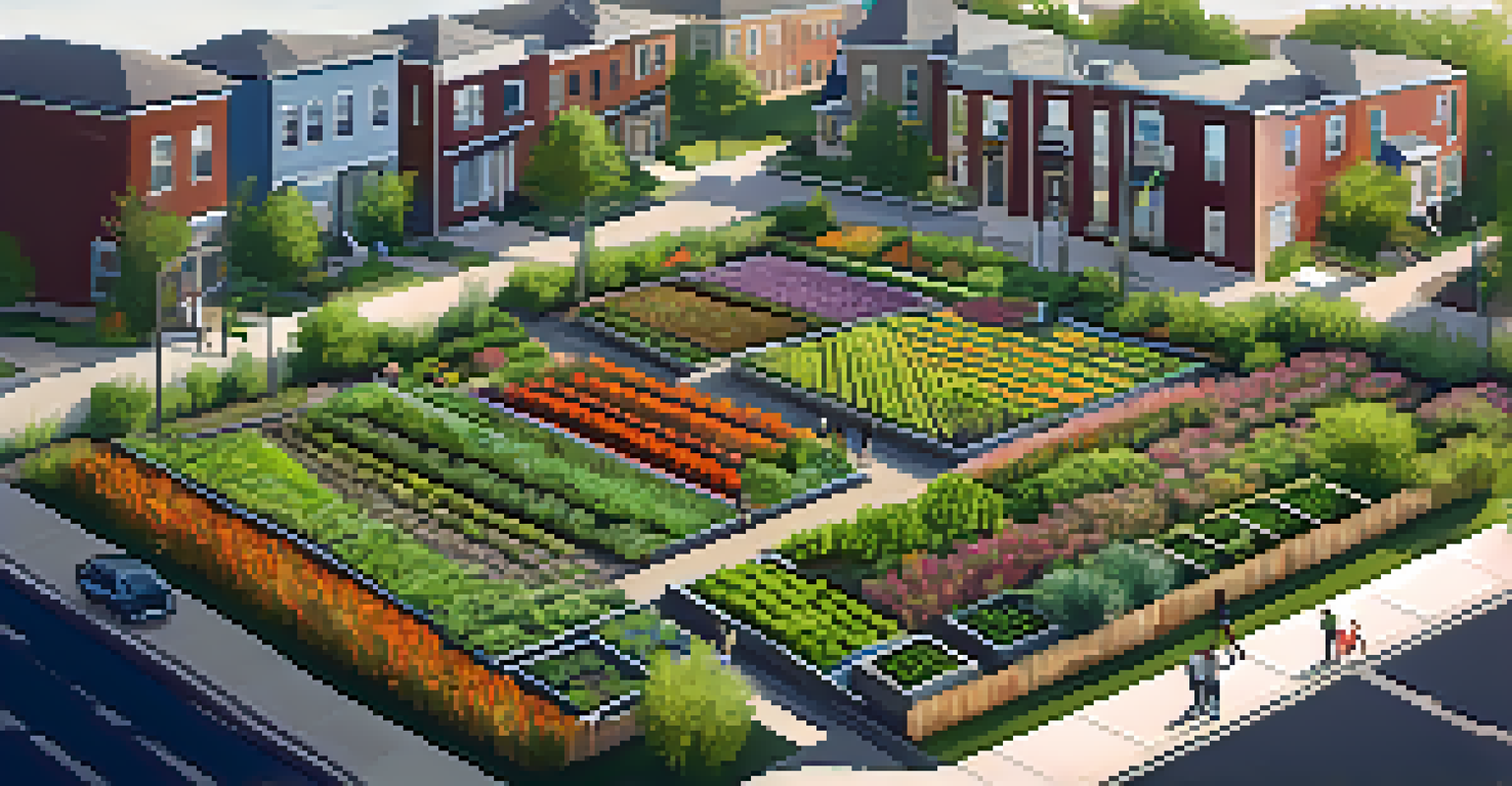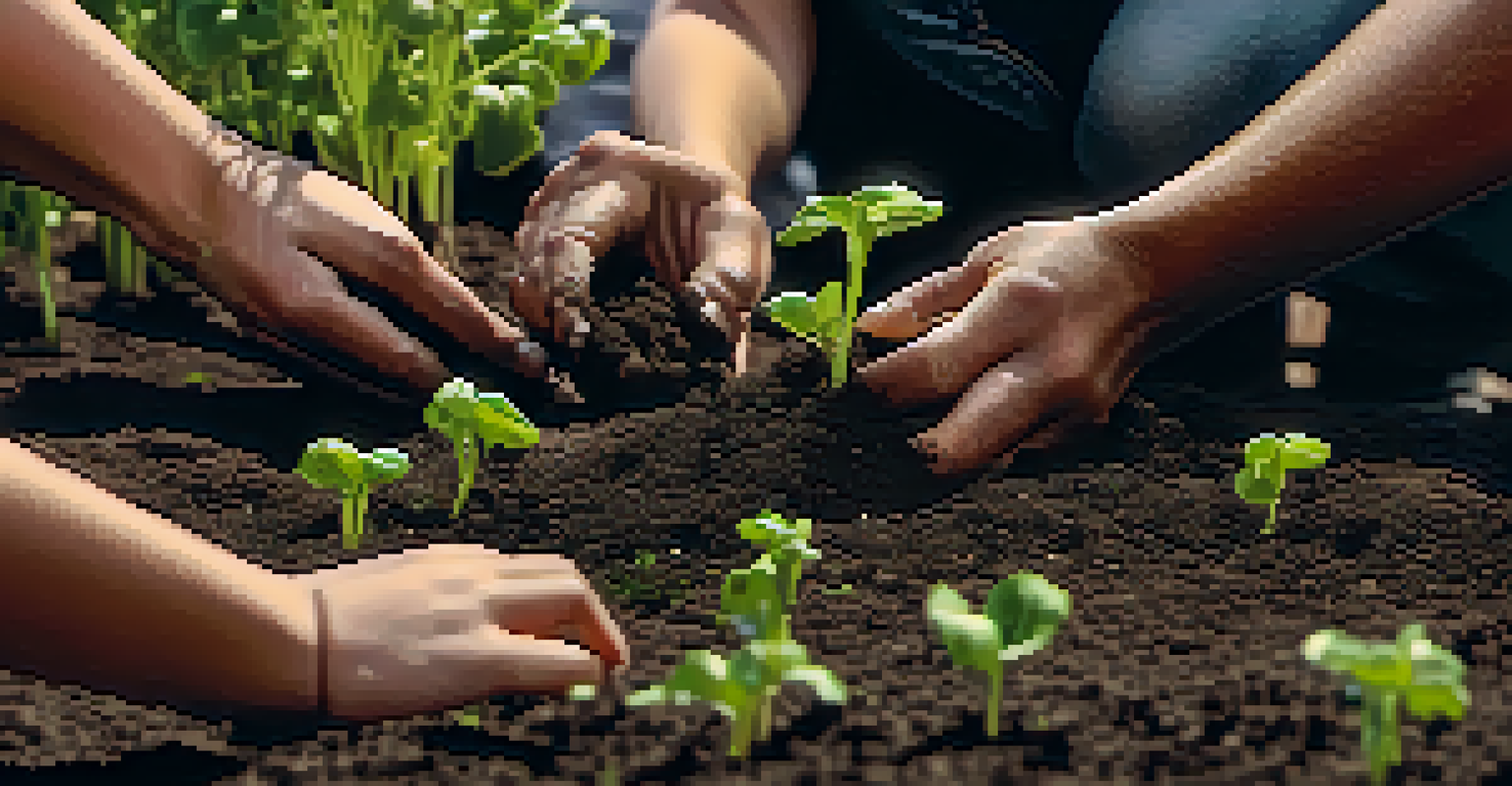Community Gardens: A Solution to Buffalo's Food Desert Problem

Understanding Food Deserts in Buffalo
Food deserts are urban areas where residents have limited access to affordable and nutritious food. Buffalo has been grappling with this issue, particularly in neighborhoods where grocery stores are scarce. The lack of fresh produce can lead to health problems, including obesity and diabetes, making it crucial to find solutions.
Food deserts are not just about access to food, but access to health and nutrition.
In Buffalo, many communities rely on convenience stores that often stock processed foods, leading to a poor diet. This situation is exacerbated by socioeconomic factors that limit transportation options, making it hard for residents to travel to distant grocery stores. Recognizing these challenges is the first step toward implementing effective solutions.
Community gardens offer a glimmer of hope in this landscape. They not only provide fresh fruits and vegetables but also foster a sense of community and empowerment among residents, making them a vital tool in addressing food deserts.
The Role of Community Gardens
Community gardens serve as green spaces where residents can grow their own food, promoting both health and well-being. They are more than just places to plant seeds; they are hubs for education and community engagement. In Buffalo, these gardens are transforming vacant lots into productive land.

By cultivating their own produce, community members can enjoy fresh vegetables and fruits that are often lacking in local stores. This not only improves their diets but also saves money, allowing families to allocate their resources towards other essential needs. Moreover, participating in gardening can lead to improved mental health through physical activity and social interaction.
Food Deserts Challenge Buffalo's Health
Buffalo faces significant health issues due to food deserts, where residents lack access to affordable and nutritious food.
The sense of ownership that comes with community gardening fosters pride and responsibility. When people nurture plants, they also cultivate relationships, strengthening the social fabric of their neighborhoods.
Benefits Beyond Nutrition
While the primary focus of community gardens is to enhance food access, their benefits extend far beyond nutrition. These gardens create a space for education, where individuals, especially children, can learn about sustainable practices and the importance of healthy eating. Workshops and programs can teach residents how to grow their own food effectively.
Community gardens are a way to bring people together, create food equity, and build a sense of community.
Additionally, community gardens promote environmental sustainability. By utilizing techniques such as composting and organic gardening, they contribute to healthier ecosystems. This not only improves the immediate environment but also teaches valuable lessons about sustainability and conservation.
Moreover, these gardens can enhance local biodiversity by attracting various pollinators and wildlife. This creates a more vibrant ecosystem, which is essential for a balanced environment and further supports the health of the community.
Community Engagement and Empowerment
One of the most significant aspects of community gardens is their ability to bring people together. They create spaces where individuals from diverse backgrounds can collaborate on a shared goal—growing food. This collective effort fosters community bonds and encourages social interaction, breaking down barriers that often exist in urban settings.
Engagement in gardening initiatives can also empower residents to take charge of their food sources. When people feel connected to their food, they are more likely to make healthier choices and advocate for their community's needs. This empowerment can lead to broader discussions about food justice and equity.
Community Gardens Foster Connection
Community gardens not only provide fresh produce but also strengthen social ties by bringing diverse residents together.
Furthermore, these gardens often become focal points for community events, such as harvest festivals and educational workshops. Such gatherings not only celebrate the bounty of the gardens but also strengthen community ties, turning neighbors into friends.
Challenges Facing Community Gardens
Despite their numerous benefits, community gardens in Buffalo face several challenges. Limited funding and resources can make it difficult to maintain these gardens over the long term. Without proper support, gardens may struggle to thrive, ultimately diminishing their impact on food accessibility.
Additionally, issues such as land ownership and zoning regulations can complicate garden establishment. In some cases, community members might face opposition from local authorities or property owners. These barriers can discourage residents from starting or maintaining gardens, which undermines their potential benefits.
Weather and environmental factors can also pose challenges. Buffalo's harsh winters and unpredictable weather patterns can impact crop yields, making it essential for gardeners to adapt and plan accordingly to ensure a successful growing season.
Successful Community Garden Initiatives in Buffalo
Buffalo has seen several successful community garden initiatives that have made a significant impact. Organizations like the Buffalo Urban Agricultural Working Group have played a pivotal role in establishing and supporting these gardens. Their efforts have not only increased food access but also fostered community pride and resilience.
One notable example is the Massachusetts Avenue Project, which combines community gardening with youth development and education. Through hands-on experiences, young people learn valuable skills while contributing to the community's food system. This initiative highlights the potential of community gardens to serve as educational platforms.
Support is Key for Garden Success
Sustaining community gardens in Buffalo requires ongoing support and collaboration to overcome challenges like funding and land regulations.
These success stories inspire others to get involved and replicate similar models in their neighborhoods. By showcasing the positive outcomes of community gardening, Buffalo can encourage more residents to participate in these initiatives and work collectively towards food justice.
The Future of Community Gardens in Buffalo
Looking ahead, the future of community gardens in Buffalo appears promising with continued community engagement and support. As awareness of food deserts and their implications grows, more individuals and organizations are rallying behind the cause of urban agriculture. This shift in mindset can lead to increased funding and resources for community garden projects.
Collaboration among community members, local government, and nonprofit organizations will be crucial for sustaining and expanding these gardens. By working together, they can address challenges and create more vibrant green spaces that serve the needs of residents. Food security and community health can become priorities through this collaborative effort.

Ultimately, community gardens in Buffalo have the potential to not only alleviate food deserts but also to transform neighborhoods into thriving hubs of activity and connection. As more residents get involved, these gardens will continue to bloom, bringing fresh produce and hope to the city.